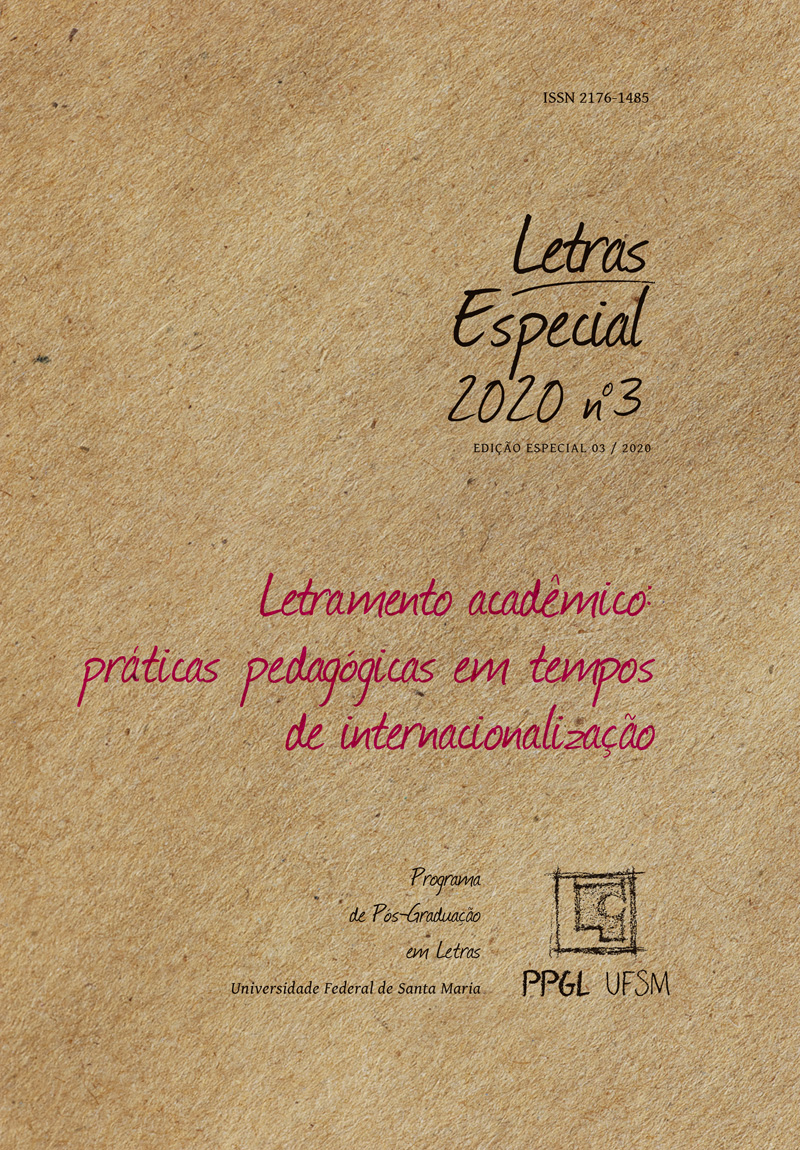English is not an only one: the development of the concept English as a lingua franca in a Language without Borders course
DOI:
https://doi.org/10.5902/2176148548477Keywords:
Concept development, Language without Borders Program, English as a lingua francaAbstract
This article aims to report the development of the concept of English as a lingua franca by five participants in a short-term face-to-face course taught by two pre-service teachers in the Languages without Borders Program at a public Brazilian municipal university. Two data collection instruments were used: responses to two quizzes applied during the course and a questionnaire applied later. In their discourses, the participants brought to light, to a certain extent, evidence of a critical understanding of the concepts of native speaker, imperialism, judgment of value, linguistic discrimination, empowerment, linguistic monitoring, linguistic variation and a focus on communicative practices.
Downloads
References
BAKHTIN, M. Marxismo e filosofia da linguagem. 12 ed. Hucitec: São Paulo, 2006.
BRASIL. Ministério da Educação. Gabinete do Ministro. Portaria nº 1.466, de 18 de dezembro de 2012. Institui o Programa Inglês sem Fronteiras. Diário Oficial da União, Brasília, DF, 19 dez. 2012. p.28-29. Disponível em: http://isf.mec.gov.br/images/pdf/portaria_normativa_1466_2012.pdf. Acesso em jan. 2019.
BRASIL. Ministério da Educação. Base Nacional Comum Curricular. Brasília, DF: 2018. Disponível em: http://basenacionalcomum.mec.gov.br/images/BNCC_EI_EF_110518_versaofinal_site.pdf. Acesso em jan. 2019.
CELCE-MURCIA, M. Language Teaching Approaches: An Overview. In: ______. (ed.). Teaching English as a Second or Foreign Language. 3 ed. Boston: Heinle & Heinle, 2001, p. 3-11.
COUNCIL OF EUROPE. Common European framework of reference for languages: Learning, teaching, assessment. Cambridge, UK: Press Syndicate of the University of Cambridge, 2001.
DAVIS, B. G. Tools for Teaching. 2nd edition. San Francisco, USA: Jossey-Bass, 2009.
ELLIS, R. The study of second language acquisition. 2nd ed. Oxford University Press, 2008.
FREIRE, P. Pedagogia do Oprimido. 39. ed. Rio de Janeiro: Paz e Terra, 2011.
FRIEDRICH, P., MATSUDA, A. When Five Words Are Not Enough: a conceptual and terminological discussion of English as a lingua franca. International Multilingual Research Journal, v. 4, n. 1, p. 20-30, 2010. DOI: https://doi.org/10.1080/19313150903500978
GEE, J. P. Learning language as a matter of learning social languages within discourses. In: M. Hawkins (Ed.). Language learning and teacher education: A sociocultural approach. Clevedon, UK: Multilingual Matters, 2004, p. 13-31. DOI: https://doi.org/10.21832/9781853597657-004
HARMER, J. The practice of English language teaching. 3rd edition. Essex, UK: Pearson Education, 2001.
JOHNSON, K. E. Second language teacher education: a sociocultural perspective. New York, USA: Routledge, 2009. DOI: https://doi.org/10.4324/9780203878033
JORDÃO, C. M. ILA – ILF – ILE – ILG: Quem dá conta? RBLA, Belo Horizonte, v. 14, n. 1, p. 13-40, 2014. DOI: https://doi.org/10.1590/S1984-63982014000100002
KACHRU, B. B. Standards, codification and sociolinguistic realism: the English language in the outer circle. In: R. Quirk, H.G. Widdowson (Eds.). English in the world: teaching and learning the language and literatures. Cambridge: Cambridge University Press, 1985, p. 11-30.
LIPPI-GREEN, R. English with an accent: language, ideology, and discrimination in the United States. 2nd edition. New York: Routledge, 2012. DOI: https://doi.org/10.4324/9780203348802
MUNRO, M. J., DERWING T. M. Processing time, accent, and comprehensibility, and intelligibility in the speech of second language learners. Language learning, v. 49, p. 285- 310, 1995. DOI: https://doi.org/10.1111/0023-8333.49.s1.8
PENNYCOOK, A. The cultural politics of English as an international language. New York: Routledge, 2017. DOI: https://doi.org/10.4324/9781315225593
RAJAGOPALAN, K. Por uma lingüística crítica: linguagem, identidade e questão ética. São Paulo: Parábola Editorial, 2003.
SEIDLHOFER, B. Closing a conceptual gap: the case for a description of English as a lingua franca. International Journal of Applied Linguistics, Oslo, v. 11, n. 2, p. 133-158, 2001. DOI: https://doi.org/10.1111/1473-4192.00011
TOMITCH, L. M. B.; TUMOLO, C. H. S. Pesquisa em Letras Estrangeiras: Inglês. Florianópolis: LLE/CCE/UFSC, 2011.
TOKUHAMA-ESPINOSA, T. Making classrooms better: 50 practical applications of Mind, Brain, and Education Science. New York, USA: W. W. Norton & Company, 2014.
VYGOTSKY, L. S. Mind in Society: The Development of Higher Psychological Processes. Cambridge, USA: Harvard University Press, 1978.
Downloads
Published
Versions
- 2022-07-26 (3)
- 2022-07-04 (2)
- 2021-10-19 (1)
How to Cite
Issue
Section
License
Copyright (c) 2021 Letras

This work is licensed under a Creative Commons Attribution-NonCommercial-ShareAlike 4.0 International License.
Ficam concedidos a Letras todos os direitos autorais referentes aos trabalhos publicados. Os originais não devem ter sido publicados ou submetidos simultaneamente a outro periódico e não serão devolvidos. Em virtude de aparecerem nesta revista de acesso público, os artigos são de uso gratuito, com atribuições próprias, em aplicações educacionais e não comerciais.






